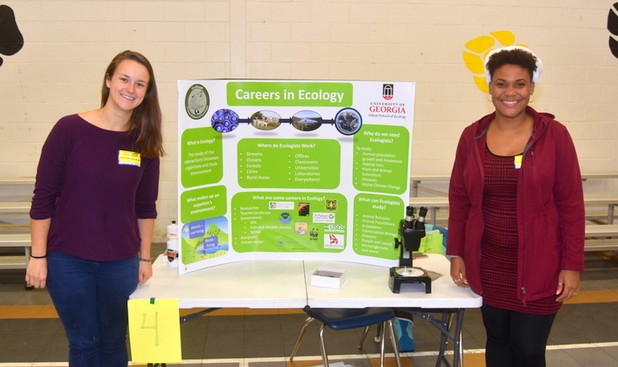April 23, 2020
Athens, Ga. – For many K-12 students, hands-on activities are an important tool for learning about science. With schools closed, students no longer have access to labs or other facilities for experiential learning. To fill that gap, University of Georgia student organization EcoReach has created a suite of online hands-on science activities that students can do from home.
“Over the past few weeks, EcoReach officers and members have been hard at work developing online environmental education resources for teachers and caregivers working with K-12 students during the COVID-19 shelter-in-place,” said Carolyn Cummins, a doctoral student in the Odum School of Ecology who is the organization’s co-president. “We’ve turned several of our classroom activities into an at-home format and uploaded them to our website for anyone to use.”
EcoReach, housed in the Odum School of Ecology, connects graduate, undergraduate, and professional ecologists at the University of Georgia with school-age children in the Athens area. Their goal is to raise awareness about the science of ecology and environmental issues while supplementing local schools’ courses to meet objectives in the state curriculum guidelines.
Typically, EcoReach works with teachers to provide flexible programs designed to meet the needs of their students. They also provide informal educational opportunities, such as presenting programs to local Scout groups, serving as judges for science fairs, and holding programs at local science days.
With those kinds of in-person opportunities no longer possible, EcoReach members realized they could adapt their approach to an online-learning format.
Virtual EcoReach activities include “Seed Fight Club,” geared for elementary to middle school students to learn about resource competition and seed dispersal, and “Plastic Pollution,” for elementary students to learn about how long it takes plastic to break down in the ocean. More will be added soon, including activities about the water cycle, freshwater invertebrates, and moths.
“In addition to our online resources, we are also available for virtual meetings and lessons with K-12 students,” said EcoReach co-president Kaylee Arnold, a doctoral student in the Interdisciplinary Disease Ecology Across Scales program. “We’ve already teamed up with a few middle school classes to discuss how sheltering-in-place is impacting our environment.”
Arnold said that one of EcoReach’s goals has been to bring scientists from diverse backgrounds into classrooms.
“It’s important for kids to know that scientists are real people that can also look like them,” said Arnold. “With this move to virtual learning, we hope to keep connecting with the schools and introducing students to our many different scientists.”
EcoReach members also have compiled a list of online environmental education resources, which they are continuing to expand.
“We would love to invite anyone to contribute additional resources to the resource list and to encourage folks to disseminate all of our resources as they see fit,” said Cummins.
For more information, visit the EcoReach website.

